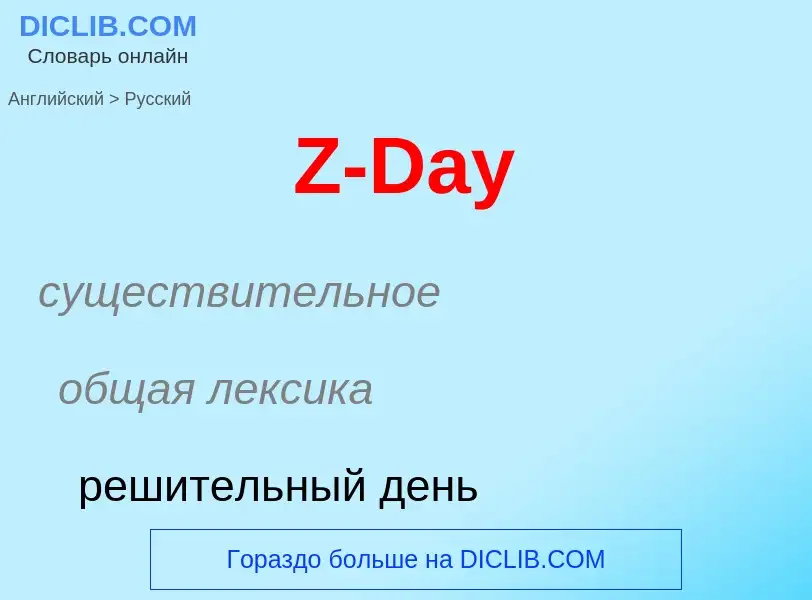Übersetzung und Analyse von Wörtern durch künstliche Intelligenz ChatGPT
Auf dieser Seite erhalten Sie eine detaillierte Analyse eines Wortes oder einer Phrase mithilfe der besten heute verfügbaren Technologie der künstlichen Intelligenz:
- wie das Wort verwendet wird
- Häufigkeit der Nutzung
- es wird häufiger in mündlicher oder schriftlicher Rede verwendet
- Wortübersetzungsoptionen
- Anwendungsbeispiele (mehrere Phrasen mit Übersetzung)
- Etymologie
Z-Day - Übersetzung nach russisch
существительное
общая лексика
решительный день
строительное дело
металлический профиль Z-образного сечения
Definition
Wikipedia

A zombie (Haitian French: zombi, Haitian Creole: zonbi) is a mythological undead corporeal revenant created through the reanimation of a corpse. Zombies are most commonly found in horror and fantasy genre works. The term comes from Haitian folklore, in which a zombie is a dead body reanimated through various methods, most commonly magic like voodoo. Modern media depictions of the reanimation of the dead often do not involve magic but rather science fictional methods such as carriers, fungi, radiation, mental diseases, vectors, pathogens, parasites, scientific accidents, etc.
The English word "zombie" was first recorded in 1819, in a history of Brazil by the poet Robert Southey, in the form of "zombi". The Oxford English Dictionary gives the word's origin as Central African and compares it to the Kongo words nzambi (god) and zumbi or nzumbi (fetish). Some authors also compare it to the Kongo word vumbi (mvumbi) (ghost, revenant, corpse that still retains the soul), (nvumbi) (body without a soul). A Kimbundu-to-Portuguese dictionary from 1903 defines the related word nzumbi as soul, while a later Kimbundu–Portuguese dictionary defines it as being a "spirit that is supposed to wander the earth to torment the living". One of the first books to expose Western culture to the concept of the voodoo zombie was W. B. Seabrook's The Magic Island (1929), the account of a narrator who encounters voodoo cults in Haiti and their resurrected thralls.
A new version of the zombie, distinct from that described in Haitian folklore, emerged in popular culture during the latter half of the 20th century. This interpretation of the zombie is drawn largely from George A. Romero's film Night of the Living Dead (1968), which was partly inspired by Richard Matheson's novel I Am Legend (1954). The word zombie is not used in Night of the Living Dead, but was applied later by fans. After zombie films such as Dawn of the Dead (1978) and Michael Jackson's music video Thriller (1983), the genre waned for some years.
The mid-90's saw the introduction of Resident Evil and The House of the Dead, two break-out successes of video games featuring zombie enemies which would later go on to become highly influential and well-known. These games were initially followed by a wave of low-budget Asian zombie films such as the zombie comedy Bio Zombie (1998) and action film Versus (2000), and then a new wave of popular Western zombie films in the early 2000s, the Resident Evil and House of the Dead films, the 2004 Dawn of the Dead remake, and the British zombie comedy Shaun of the Dead (2004). The "zombie apocalypse" concept, in which the civilized world is brought low by a global zombie infestation, has since become a staple of modern popular art, seen in such media as The Walking Dead franchise.
The late 2000s and 2010s saw the humanization and romanticization of the zombie archetype, with the zombies increasingly portrayed as friends and love interests for humans. Notable examples of the latter include movies Warm Bodies and Zombies, novels American Gods by Neil Gaiman, Generation Dead by Daniel Waters, and Bone Song by John Meaney, animated movie Corpse Bride, TV series Pushing Daisies and iZombie, and manga/novel/anime series Sankarea: Undying Love and Is This a Zombie? In this context, zombies are often seen as stand-ins for discriminated groups struggling for equality, and the human–zombie romantic relationship is interpreted as a metaphor for sexual liberation and taboo breaking (given that zombies are subject to wild desires and free from social conventions).


![One of the various zombie panel discussion at the 2012 [[New York Comic Con]], featuring writers who have worked in the genre (left to right): [[Jonathan Maberry]], Daniel Kraus, [[Stefan Petrucha]], Will Hill, [[Rachel Caine]], Chase Novak, and [[Christopher Krovatin]]. Also present (but not visible in the photo) was [[Barry Lyga]]. One of the various zombie panel discussion at the 2012 [[New York Comic Con]], featuring writers who have worked in the genre (left to right): [[Jonathan Maberry]], Daniel Kraus, [[Stefan Petrucha]], Will Hill, [[Rachel Caine]], Chase Novak, and [[Christopher Krovatin]]. Also present (but not visible in the photo) was [[Barry Lyga]].](https://commons.wikimedia.org/wiki/Special:FilePath/10.13.12ZombiePanelByLuigiNovi1.jpg?width=200)
![T. P. Cooke]] as Frankenstein's Monster in an 1823 stage production of the novel T. P. Cooke]] as Frankenstein's Monster in an 1823 stage production of the novel](https://commons.wikimedia.org/wiki/Special:FilePath/Frankenstein Cooke 1823.jpg?width=200)

![[[Tor Johnson]] as a zombie with his victim in the cult movie ''[[Plan 9 from Outer Space]]'' (1959) [[Tor Johnson]] as a zombie with his victim in the cult movie ''[[Plan 9 from Outer Space]]'' (1959)](https://commons.wikimedia.org/wiki/Special:FilePath/Tor Johnson.jpg?width=200)
![A depiction of a zombie at twilight in a field of [[sugar cane]] A depiction of a zombie at twilight in a field of [[sugar cane]]](https://commons.wikimedia.org/wiki/Special:FilePath/Zombie haiti ill artlibre jnl.png?width=200)

